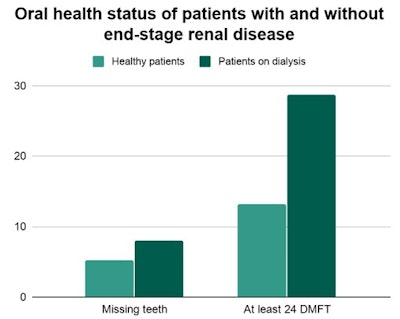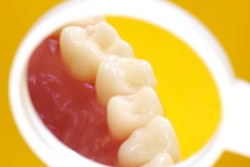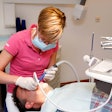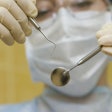
Poor oral health may be linked to worse heart health for patients with end-stage renal disease. A study found that patients on hemodialysis had significantly worse oral health than their peers and that these patients may also be at risk for arteriosclerosis, or hardening of the arteries.
The study compared the caries status and periodontal health of dozens of patients with advanced kidney disease and healthy aged-match peers. Overall, patients on hemodialysis had higher rates of decayed, missing, and filled teeth (DMFT) and teeth with entirely destroyed crowns. The researchers called for additional oral health support and care for these patients.
"These results indicate that patients on [hemodialysis] are not receiving sufficient oral care and treatment," wrote the authors, led by Taro Misaki from the division of nephrology at Seirei Hamamatsu General Hospital in Hamamatsu, Japan (PLOS One, December 13, 2019).
"The main reason might be that patients must undergo [hemodialysis] three times weekly at a hospital and might not have time to visit a dentist."
Not only do patients with end-stage renal disease undergo hemodialysis multiple times per week, but they also are susceptible to infections and tend to take anticoagulants, which may make some dentists hesitant to treat them. As a result, the researchers wondered whether patients on dialysis have worse oral health status than their peers without end-stage renal disease.
For the study, the researchers recruited 80 patients on hemodialysis from Seirei Hamamatsu General Hospital and 76 age-matched control patients from a nearby dental clinic. Two dentists evaluated the caries and periodontal status of the patients with and without end-stage renal disease.

Patients on hemodialysis had significantly more teeth with entirely destroyed crowns, more missing teeth, and a higher prevalence of at least 24 decayed, missing, and filled teeth than their peers. However, they were not more likely to have worse periodontal health.
Among patients on hemodialysis alone, those with at least 24 decayed, missing, and filled teeth were also significantly more likely to have a pulse pressure of more than 80 mmHg. This finding suggests patients on dialysis with more severe tooth decay may also be more at-risk for hardening of the arteries, the authors noted.
"Worse dental caries was associated with high pulse pressure among patients on [hemodialysis], indicating that such patients might have arteriosclerosis," the authors wrote. "Reports indicate that arteriosclerosis progresses along with increases in pulse pressure difference and that this is associated with cardiovascular disease."
The researchers noted a number of study limitations, including only using patients from one city in Japan and not being able to evaluate confounding variables. They cautioned more research is needed to verify their findings.
"Whether persistent dental caries can induce arteriosclerosis remains to be confirmed in animal models," the authors concluded. "Our results must be confirmed by future prospective and larger multi-institutional studies."



















